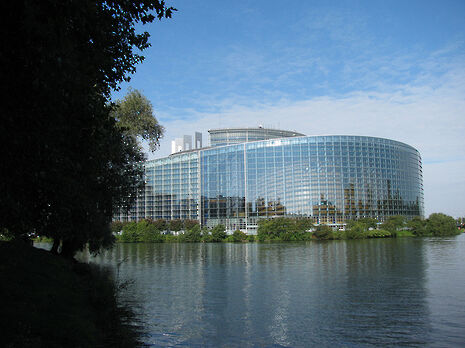“If I couldn’t vote Labour I wouldn’t vote.”
Hesham Mashhour meets Labour MEP Richard Howitt ahead of the upcoming European elections.

It’s raining outside and we’ve taken refuge in the Sidgwick buttery. From afar he seemed intimidating; a big man in a suit surrounded by his very own royal entourage of willing Labour enthusiasts. But up close, in all the intimacy our buttery has to offer, Richard Howitt looks tired; perhaps even exhausted from the campaign trail and the long road that still lies ahead – I begin to wonder whether the 53 year old would ever quiet consider quitting politics. I keep that thought and press forward with the interview.
However it’s not quite over for Richard, at least not yet. He’s still full of vigour and it is as if he feels the European elections are a nuisance; it’s clear he can’t wait to win and go back to doing his job in the European Parliament. But what exactly is his job? “Recently that’s involved the conflict in Ukraine and Europe’s response to that,” he tells me. “I’ve been pressing for stronger sanctions because I believe that’s the best way to prevent conflict.”
He admits he feels Europe is taking action too slowly against Russia but still feels that what Britain, and the rest of the world need, is a strong Europe. He expresses his dislike for Conservative attitudes towards Europe and makes the accusation that the Conservatives "want to pretend that our powers are taken over when they’re not … only by working together in Europe can we worry Vladimir Putin enough to stop potential military expansionism.”
It soon becomes clear that Howitt is an internationalist and proud of his work for the Foreign Affairs and Human Rights committees as he changes topic to speak about his recent visit to Qatar: “there are allegations of deep human rights abuses against migrant labour … [they’re] literally trapped in the country if they complain against their employer – their employer can prevent them getting an exit visa.” Before too long, however, he steals the opportunity to rile against the Conservative Party again claiming that, “they’re undermining [human rights] principles that Britain should be standing for.”
He wishes to encourage students at Cambridge who stand for human rights to vote Labour and not any other party. But when asked exactly why students at Cambridge should vote for Labour in the European elections, the answers become less clear-cut. He feels that many students will go through Cambridge and "end up in low-level jobs because they can’t find jobs they want,” and that a vote for Labour in the upcoming European elections will help to prevent that. For Howlitt, Labour’s policies are aimed "against austerity for jobs and growth to guarantee young people getting jobs.”
Howitt seemed passionate about immigration reforms, however, labelling the policies of the Conservatives and UKIP as, “dog-whistle", "racist" and "prejudiced,” complaining that UKIP has pulled the Conservative Party too far to the right. He concludes that Labour are proposing controlled and well-managed immigration, and that the best way to prevent a UKIP victory in the next European elections is a “positive Labour offer.”
Howitt was equally vocal in his criticism of the Liberal Democrats, reminding us: “Nick Clegg made his promise against a rise in tuition fees here in Cambridge and he broke it." He feels that students "will recognise when they’re told a promise and that promise is broken that they shouldn’t reward the party that made the promise.” When asked why Cambridge students should not vote for the Liberal Democrats particularly in the European elections, Howitt referred to an incident where, “Nick Clegg put his own party interest before the European cause [by agreeing to a live debate with UKIP] to save Liberal Democrats MP seats … he would have done much better not to give UKIP that lift up.”
Though it is telling how Richard Howitt managed to take every question as an opportunity to discredit his opposition, and though I don’t associate myself with the Labour Party, I find it hard not to agree with the Labour position for a strong and independent Britain in a strong Europe, on issues like immigration and human rights.
One other thing that seems even more incredible is Richard Howitt’s deep emotional involvement with the Labour Party. Whether you’re voting Labour or not in the next election, it is worth noting the sentiment in Howitt’s final words to me in the interview: “I come from a one-parent family on a council estate, my mum was a barmaid working at a pub." He pauses: "she and my family were never members of the Labour Party, but we were a Labour family. I was brought up as a Labour child.”
“If I couldn’t vote Labour I wouldn’t vote.”
It is only then I realise that, whether right or wrong, politicians like Richard Howitt just don’t quit.
 News / Arms divestment would be ‘existential’ threat to the University, says academic5 July 2025
News / Arms divestment would be ‘existential’ threat to the University, says academic5 July 2025 Lifestyle / It’s pretty fun to talk to strangers3 July 2025
Lifestyle / It’s pretty fun to talk to strangers3 July 2025 Science / It’s only rocket science, Elon3 July 2025
Science / It’s only rocket science, Elon3 July 2025 News / Academics lead campaign against Lord Browne Chancellor bid2 July 2025
News / Academics lead campaign against Lord Browne Chancellor bid2 July 2025 News / Clare students call on College to divest3 July 2025
News / Clare students call on College to divest3 July 2025








